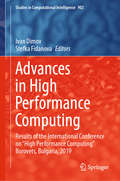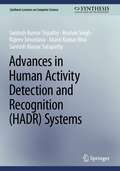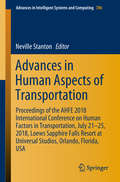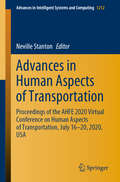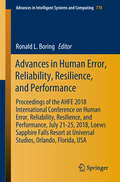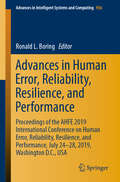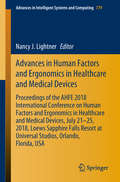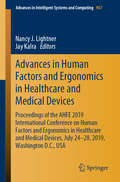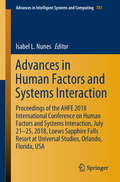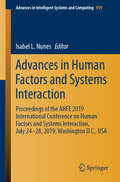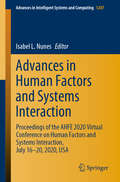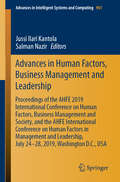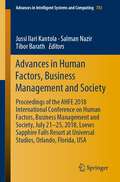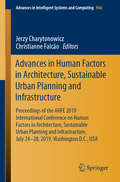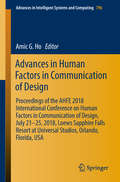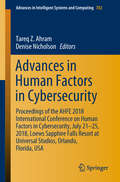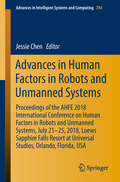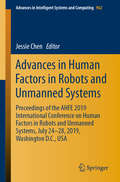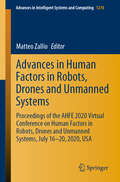- Table View
- List View
Advances in High Performance Computing: Results of the International Conference on “High Performance Computing” Borovets, Bulgaria, 2019 (Studies in Computational Intelligence #902)
by Ivan Dimov Stefka FidanovaEvery day we need to solve large problems for which supercomputers are needed. High performance computing (HPC) is a paradigm that allows to efficiently implement large-scale computational tasks on powerful supercomputers unthinkable without optimization. We try to minimize our effort and to maximize the achieved profit. Many challenging real world problems arising in engineering, economics, medicine and other areas can be formulated as large-scale computational tasks. The volume is a comprehensive collection of extended contributions from the High performance computing conference held in Borovets, Bulgaria, September 2019. This book presents recent advances in high performance computing. The topics of interest included into this volume are: HP software tools, Parallel Algorithms and Scalability, HPC in Big Data analytics, Modelling, Simulation & Optimization in a Data Rich Environment, Advanced numerical methods for HPC, Hybrid parallel or distributed algorithms. The volume is focused on important large-scale applications like Environmental and Climate Modeling, Computational Chemistry and Heuristic Algorithms.
Advances in Human Activity Detection and Recognition (Synthesis Lectures on Computer Science)
by Santosh Kumar Tripathy Roshan Singh Rajeev Srivastava Akash Kumar Bhoi Santosh Kumar SatapathyThis book provides a comprehensive overview of Human Activity Detection or Recognition (HADR) systems. Detection or recognition of human activities is a prominent research area in the fields of computer vision and artificial intelligence because of its many applications in daily life, including monitoring in public transport areas, health monitoring, anomaly detection in traffic, and smart homes. This book divides different activities according to their criticality, then discusses the various motivations and challenges that are involved in HADR systems. The authors then propose a framework for activity detection or recognition. The book also covers ten key applications of HADR systems and the recent developments for each of them. The authors also propose areas for future research.
Advances in Human Aspects of Transportation: Proceedings of the AHFE 2018 International Conference on Human Factors in Transportation, July 21-25, 2018, Loews Sapphire Falls Resort at Universal Studios, Orlando, Florida, USA (Advances in Intelligent Systems and Computing #786)
by Neville StantonThis book discusses the latest advances in research and development, design, operation and analysis of transportation systems and their complementary infrastructures. It reports on both theories and case studies on road and rail, aviation and maritime transportation. Further, it covers a wealth of topics, from accident analysis, vehicle intelligent control, and human-error and safety issues to next-generation transportation systems, model-based design methods, simulation and training techniques, and many more. A special emphasis is placed on smart technologies and automation in transport, and on the user-centered, ergonomic and sustainable design of transport systems. The book, which is based on the AHFE 2018 International Conference on Human Factors in Transportation, held in Orlando, Florida, USA on July 21–25, 2018, mainly addresses the needs of transportation system designers, industrial designers, human–computer interaction researchers, civil and control engineers, as well as vehicle system engineers. Moreover, it represents a timely source of information for transportation policy-makers and social scientists whose work involves traffic safety, management, and sustainability issues in transport.
Advances in Human Aspects of Transportation: Proceedings of the AHFE 2020 Virtual Conference on Human Aspects of Transportation, July 16-20, 2020, USA (Advances in Intelligent Systems and Computing #1212)
by Neville StantonThis book discusses the latest advances in the research and development, design, operation, and analysis of transportation systems and their corresponding infrastructures. It presents both theories and case studies on road and rail, aviation, and maritime transportation. Further, it covers a wealth of topics, from accident analysis, intelligent vehicle control, and human-error and safety issues to next-generation transportation systems, model-based design methods, simulation and training techniques, and many more. Special emphasis is placed on smart technologies and automation in transport, as well as the user-centered, ergonomic, and sustainable design of transportation systems. The book, which is based on the AHFE 2020 Virtual Conference on Human Aspects of Transportation, held on July 16–20, 2020, mainly addresses the needs of transportation system designers, industrial designers, human–computer interaction researchers, civil and control engineers, as well as vehicle system engineers. Moreover, it represents a timely source of information for transportation policy-makers and social scientists whose work involves traffic safety, management, and sustainability issues in transport.
Advances in Human Dynamics for the Development of Contemporary Societies: Proceedings of the AHFE 2021 Virtual Conference on Human Dynamics for the Development of Contemporary Societies, July 25-29, 2021, USA (Lecture Notes in Networks and Systems #277)
by Daniel Raposo Nuno Martins Daniel BrandãoThis book addresses the importance of human factors in the design of artifacts and systems that serves contemporary individual and societal needs. It reports on cutting-edge, multidisciplinary design research and practices fostering creativity, interaction and co-creation, sustainability, digital development, mobility, as well as science and education. Gathering contributions to the first edition of the AHFE 2021 Affiliated Conference on Human Dynamics for the Development of Contemporary Societies, held virtually on July 25-29, 2021, from USA, this book, which brings together experts with different design and human factors engineering as well as user interface and user experience backgrounds, offers a timely perspective on the role of human factors and design in the developments of modern society and is expected to foster new approaches and interdisciplinary collaboration.
Advances in Human Error, Reliability, Resilience, and Performance: Proceedings of the AHFE 2018 International Conference on Human Error, Reliability, Resilience, and Performance, July 21-25, 2018, Loews Sapphire Falls Resort at Universal Studios, Orlando, Florida, USA (Advances in Intelligent Systems and Computing #778)
by Ronald L. BoringThis book brings together studies broadly addressing human error from different disciplines and perspectives. It discusses topics such as human performance; human variability and reliability analysis; medical, driver and pilot error, as well as automation error; root cause analyses; and the cognitive modeling of human error. In addition, it highlights cutting-edge applications in safety management, defense, security, transportation, process controls, and medicine, as well as more traditional fields of application. Based on the AHFE 2018 International Conference on Human Error, Reliability, Resilience, and Performance, held on July 21–25, 2018, in Orlando, Florida, USA, the book includes experimental papers, original reviews, and reports on case studies, as well as meta-analyses, technical guidelines, best practice and methodological papers. It offers a timely reference guide for researchers and practitioners dealing with human error in a diverse range of fields.
Advances in Human Error, Reliability, Resilience, and Performance: Proceedings of the AHFE 2019 International Conference on Human Error, Reliability, Resilience, and Performance, July 24-28, 2019, Washington D.C., USA (Advances in Intelligent Systems and Computing #956)
by Ronald L. BoringThis book brings together studies broadly addressing human error from different disciplines and perspectives. It discusses topics such as human performance; human variability and reliability analysis; medical, driver and pilot error, as well as automation error; root cause analyses; and the cognitive modeling of human error. In addition, it highlights cutting-edge applications in safety management, defense, security, transportation, process controls, and medicine, as well as more traditional fields of application. Based on the AHFE 2019 International Conference on Human Error, Reliability, Resilience, and Performance, held on July 24-28, 2019, Washington D.C., USA, the book includes experimental papers, original reviews, and reports on case studies, as well as meta-analyses, technical guidelines, best practice and methodological papers. It offers a timely reference guide for researchers and practitioners dealing with human error in a diverse range of fields.
Advances in Human Factors and Ergonomics in Healthcare and Medical Devices: Proceedings of the AHFE 2018 International Conference on Human Factors and Ergonomics in Healthcare and Medical Devices, July 21-25, 2018, Loews Sapphire Falls Resort at Universal Studios, Orlando, Florida, USA (Advances in Intelligent Systems and Computing #779)
by Nancy J. LightnerThis book shows how human factors and ergonomic principles have been transforming healthcare. It reports on the design of systems and devices to improve quality, safety, efficiency, and effectiveness in patient care, and discusses findings related to improving organizational outcomes in a healthcare setting, as well as approaches for analyzing and modeling those work aspects that are unique to healthcare. Based on the AHFE 2018 International Conference on Human Factors and Ergonomics in Healthcare and Medical Devices, held on July 21–25, 2018, in Orlando, Florida, USA, the book highlights the physical, cognitive and organizational aspects of human factors and ergonomic applications, presenting various perspectives, including those of clinicians, patients, health organizations, and insurance providers. The book is intended as a timely reference guide for researchers involved in the design of medical systems, healthcare professionals managing healthcare settings, as well as healthcare counselors and international health organizations.
Advances in Human Factors and Ergonomics in Healthcare and Medical Devices: Proceedings of the AHFE 2019 International Conference on Human Factors and Ergonomics in Healthcare and Medical Devices, July 24-28, 2019, Washington D.C., USA (Advances in Intelligent Systems and Computing #957)
by Nancy J. Lightner Jay KalraThis book explores how human factors and ergonomic principles are currently transforming healthcare. It reports on the design of systems and devices to improve the quality, safety, efficiency and effectiveness of patient care, and discusses findings on improving organizational outcomes in the healthcare setting, as well as approaches to analyzing and modeling those work aspects that are unique to healthcare. Based on papers presented at the AHFE 2019 International Conference on Human Factors and Ergonomics in Healthcare and Medical Devices, held on July 24–28, 2019, in Washington, DC, USA, the book highlights the physical, cognitive and organizational aspects of human factors and ergonomic applications, and shares various perspectives, including those of clinicians, patients, health organizations, and insurance providers. Given its scope, the book offers a timely reference guide for researchers involved in the design of medical systems, and healthcare professionals managing healthcare settings, as well as healthcare counselors and international health organizations.
Advances in Human Factors and System Interactions: Proceedings of the AHFE 2021 Virtual Conference on Human Factors and Systems Interaction, July 25-29, 2021, USA (Lecture Notes in Networks and Systems #265)
by Isabel L. NunesThis book reports on innovative system interfaces, with a special emphasis on their design, development and testing, and on improving the interaction and integration with the users. Focusing on the advantages and challenges of virtual, augmented and mixed reality systems, it describes novel interface technologies, together with cutting-edge strategies for improving usability and accessibility, and cover a wide range of applications from business organization to disaster and crises management, from smart manufacturing to assistive technologies and transportation. Based on the AHFE 2021 Conference on Human Factors and Systems Interaction, held virtually on July 25–29, 2021, from USA, the book offers a timely survey on systems interfaces for a more efficient and safer human-system integration, addressing systems engineers, UX researchers and technology users alike.
Advances in Human Factors and Systems Interaction: Proceedings of the AHFE 2018 International Conference on Human Factors and Systems Interaction, July 21-25, 2018, Loews Sapphire Falls Resort at Universal Studios, Orlando, Florida, USA (Advances in Intelligent Systems and Computing #781)
by Isabel L. NunesThis book reports on cutting-edge research into innovative system interfaces, highlighting both lifecycle development and human–technology interaction, especially in virtual, augmented and mixed-reality systems. It describes advanced methodologies and tools for evaluating and improving interface usability and discusses new models, as well as case studies and good practices. The book addresses the human, hardware, and software factors in the process of developing interfaces for optimizing total system performance, particularly innovative computing technologies for teams dealing with dynamic environments, while minimizing total ownership costs. It also highlights the forces currently shaping the nature of computing and systems, including the need for decreasing hardware costs; the importance of portability, which translates to the modern tendency toward hardware miniaturization and technologies for reducing power requirements; the necessity of a better assimilation of computation in the environment; and social concerns regarding access to computers and systems for people with special needs. The book, which is based on the AHFE 2018 International Conference on Human Factors and Systems Interaction, held on July 21–25, 2018, in Orlando, Florida, USA, offers a timely survey and practice-oriented guide for systems interface users and developers alike.
Advances in Human Factors and Systems Interaction: Proceedings of the AHFE 2019 International Conference on Human Factors and Systems Interaction, July 24-28, 2019, Washington D.C., USA (Advances in Intelligent Systems and Computing #959)
by Isabel L. NunesThis book reports on cutting-edge research into innovative system interfaces, highlighting both lifecycle development and human–technology interaction, especially in virtual, augmented and mixed-reality systems. It describes advanced methodologies and tools for evaluating and improving interface usability and discusses new models, as well as case studies and good practices. The book addresses the human, hardware, and software factors in the process of developing interfaces for optimizing total system performance, while minimizing their costs. It also highlights the forces currently shaping the nature of computing and systems, such as: the importance of portability and technologies for reducing power requirements; the necessity of a better assimilation of computation in the environment; as well as solutions to promote accessibility to computers and systems for people with special needs. The book, which is based on the AHFE 2019 International Conference on Human Factors and Systems Interaction, held on July 24-28, 2019, in Washington D.C., USA, offers a timely survey and practice-oriented guide for systems interface users and developers alike.
Advances in Human Factors and Systems Interaction: Proceedings of the AHFE 2020 Virtual Conference on Human Factors and Systems Interaction, July 16-20, 2020, USA (Advances in Intelligent Systems and Computing #1207)
by Isabel L. NunesThis book presents cutting-edge research on innovative system interfaces, highlighting both lifecycle development and human–technology interaction, especially in virtual, augmented and mixed reality systems. It describes advanced methodologies and tools for evaluating and improving interface usability, and discusses new models, case studies and good practices. The book addresses the human, hardware, and software factors in the process of developing interfaces for optimizing total system performance, while minimizing costs. It also highlights the forces currently shaping the nature of computing and systems, such as the importance of portability and technologies for reducing power requirements; the need for better assimilation of computation in the environment; and solutions to promote computer and system accessibility for people with special needs. Based on the AHFE 2020 Virtual Conference on Human Factors and Systems Interaction, held on July 16–20, 2020, the book offers a timely survey and a practice-oriented guide for systems interface users and developers alike.
Advances in Human Factors, Business Management and Leadership: Proceedings Of The Ahfe 2017 Conference On Human Factors, Business Management And Society And The Ahfe 2017 Conference On Human Factors In Management And Leadership, July 17-21, 2017, Los Angeles, California, Usa (Advances in Intelligent Systems and Computing #594)
by Jussi Ilari Kantola Salman NazirThis book presents practical approaches for facilitating the achievement of excellence in the management and leadership of organizational resources. It shows how the principles of creating shared value can be applied to ensure faster learning, training, business development, and social renewal. In particular, it presents novel methods and tools for tackling the complexity of management and learning in both business organizations and society. Discussing ontologies, intelligent management systems, methods for creating knowledge and value added, it offers novel insights into time management and operations optimization, as well as advanced methods for evaluating customers’ satisfaction and conscious experience. Based on two conferences, the AHFE 2019 International Conference on Human Factors, Business Management and Society, and the AHFE 2019 International Conference on Human Factors in Management and Leadership, held in July 24-28, 2019, Washington D.C., USA, the book provides both researchers and professionals with new tools and inspiring ideas for achieving excellence in various business activities.
Advances in Human Factors, Business Management and Society: Proceedings of the AHFE 2018 International Conference on Human Factors, Business Management and Society, July 21-25, 2018, Loews Sapphire Falls Resort at Universal Studios, Orlando, Florida, USA (Advances in Intelligent Systems and Computing #783)
by Jussi Ilari Kantola Tibor Barath Salman NazirThis book presents practical approaches for facilitating the achievement of excellence in the management and leadership of organizational resources. It shows how the principles of creating shared value can be applied to ensure faster learning, training, business development, and social renewal. In particular, it presents novel methods and tools for tackling the complexity of management and learning in both business organizations and society. Discussing ontologies, intelligent management systems, methods for creating knowledge and value added, it offers novel insights into time management and operations optimization, as well as advanced methods for evaluating customers’ satisfaction and conscious experience. Based on two conferences, the AHFE 2018 International Conference on Human Factors, Business Management and Society, and the AHFE 2018 International Conference on Human Factors in Management and Leadership, held on July 21–25, 2018, in Orlando, Florida, USA, the book provides both researchers and professionals with new tools and inspiring ideas for achieving excellence in various business activities.
Advances in Human Factors in Architecture, Sustainable Urban Planning and Infrastructure: Proceedings of the AHFE 2019 International Conference on Human Factors in Architecture, Sustainable Urban Planning and Infrastructure, July 24-28, 2019, Washington D.C., USA (Advances in Intelligent Systems and Computing #966)
by Jerzy Charytonowicz Christianne FalcãoThis book discusses human factors research directed towards realizing and assessing sustainability in the built environment and architecture. It reports on advanced engineering methods for sustainable infrastructure design, architecture as well as on assessments of the efficient methods and the social, environmental, and economic impact of various designs and projects. The book covers a range of topics, including the use of recycled materials in architecture, ergonomics in buildings and public design, sustainable design for smart cities, design for the aging population, industrial design, human scale in architecture, and many more. Based on the AHFE 2019 International Conference on Human Factors in Architecture, Sustainable Urban Planning and Infrastructure, held on July 24-28, 2019, in Washington D.C., USA, it offers various perspectives on sustainability and ergonomics. As such, it is a valuable reference resource for designers, urban engineers, architects, infrastructure professionals, public infrastructure owners, policy makers, government engineers and planners, as well as operations managers and academics active in urban and infrastructure research.
Advances in Human Factors in Communication of Design: Proceedings of the AHFE 2018 International Conference on Human Factors in Communication of Design, July 21-25, 2018, Loews Sapphire Falls Resort at Universal Studios, Orlando, Florida, USA (Advances in Intelligent Systems and Computing #796)
by Amic G. HoThis book focuses on the emerging role of human factors in understanding, communicating with and engaging users. It reports on innovative approaches, highlighting visuals cues, such as new typographies, geometries and graphics for mobile and computer interfaces. The book also covers image and video processing, user-focused data compression, generative visuals, computational photography, and interactive design. Further topics include creative and empathetic design, human touch in digital graphics and experiential graphics. Based on the AHFE 2018 International Conference on Human Factors in Communication of Design, held on July 21–25, 2018, in Orlando, Florida, USA, this book reports on new findings, best-practices and case studies, providing readers with a fresh perspective and novel insights into the applications of human factors for enhancing the communication of design to users.
Advances in Human Factors in Communication of Design: Proceedings of the AHFE 2019 International Conference on Human Factors in Communication of Design, July 24-28, 2019, Washington D.C., USA (Advances in Intelligent Systems and Computing #974)
by Amic G. HoThis book focuses on the emerging role of human factors in understanding, communicating with and engaging users. It reports on innovative approaches, highlighting visuals cues, such as new typographies, geometries and graphics for mobile and computer interfaces. The book also covers image and video processing, user-focused data compression, generative visuals, computational photography, and interactive design. Further topics include creative and empathetic design, human touch in digital graphics and experiential graphics. Based on the AHFE 2019 International Conference on Human Factors in Communication of Design, held on July 24-28, 2019, in Washington D.C., USA, this book reports on new findings, best-practices and case studies, providing readers with a fresh perspective and novel insights into the applications of human factors for enhancing the communication of design to users.
Advances in Human Factors in Cybersecurity: Proceedings of the AHFE 2019 International Conference on Human Factors in Cybersecurity, July 24-28, 2019, Washington D.C., USA (Advances in Intelligent Systems and Computing #960)
by Tareq Ahram Waldemar KarwowskiThis book reports on the latest research and developments in the field of cybersecurity, particularly focusing on personal security and new methods for reducing human error and increasing cyber awareness, as well as innovative solutions for increasing the security of advanced Information Technology (IT) infrastructures. It covers a broad range of topics, including methods for human training; novel cyber-physical and process-control systems; social, economic, and behavioral aspects of cyberspace; issues concerning the cybersecurity index; security metrics for enterprises; and risk evaluation. Based on the AHFE 2019 International Conference on Human Factors in Cybersecurity, held on July 24-28, 2019, in Washington D.C., USA, the book not only presents innovative cybersecurity technologies, but also discusses emerging threats, current gaps in the available systems, and future challenges that may be successfully overcome with the help of human factors research.
Advances in Human Factors in Cybersecurity: Proceedings of the AHFE 2018 International Conference on Human Factors in Cybersecurity, July 21-25, 2018, Loews Sapphire Falls Resort at Universal Studios, Orlando, Florida, USA (Advances in Intelligent Systems and Computing #782)
by Tareq Z. Ahram Denise NicholsonThis book reports on the latest research and developments in the field of cybersecurity, particularly focusing on personal security and new methods for reducing human error and increasing cyber awareness, as well as innovative solutions for increasing the security of advanced Information Technology (IT) infrastructures. It covers a broad range of topics, including methods for human training; novel cyber-physical and process-control systems; social, economic, and behavioral aspects of cyberspace; issues concerning the cybersecurity index; security metrics for enterprises; and risk evaluation. Based on the AHFE 2018 International Conference on Human Factors in Cybersecurity, held on July 21–25, 2018, in Orlando, Florida, USA, the book not only presents innovative cybersecurity technologies, but also discusses emerging threats, current gaps in the available systems, and future challenges that can be successfully overcome with the help of human factors research.
Advances in Human Factors in Cybersecurity: AHFE 2020 Virtual Conference on Human Factors in Cybersecurity, July 16–20, 2020, USA (Advances in Intelligent Systems and Computing #1219)
by Isabella Corradini Enrico Nardelli Tareq AhramThis book reports on the latest research and developments in the field of human factors in cybersecurity. It analyzes how the human vulnerabilities can be exploited by cybercriminals and proposes methods and tools to increase cybersecurity awareness. The chapters cover the social, economic and behavioral aspects of the cyberspace, providing a comprehensive perspective to manage cybersecurity risks. By gathering the proceedings of the AHFE Virtual Conference on Human Factors Cybersecurity, held on July 16–20, 2020, this book offers a timely perspective of key psychological and organizational factors influencing cybersecurity, reporting on technical tools, training methods and personnel management strategies that should enable achieving a holistic cyber protection for both individuals and organizations. By combining concepts and methods of engineering, education, computer science and psychology, it offers an inspiring guide for researchers and professionals, as well as decision-makers, working at the interfaces of those fields.
Advances in Human Factors in Cybersecurity: Proceedings of the AHFE 2017 International Conference on Human Factors in Cybersecurity, July 17−21, 2017, The Westin Bonaventure Hotel, Los Angeles, California, USA (Advances in Intelligent Systems and Computing #593)
by Denise NicholsonThis book reports on the latest research and developments in the field of cybersecurity, placing special emphasis on personal security and new methods for reducing human error and increasing cyber awareness, as well as innovative solutions for increasing the security of advanced Information Technology (IT) infrastructures. It covers a broad range of topics, including methods for human training; novel Cyber-Physical and Process-Control Systems; social, economic, and behavioral aspects of cyberspace; issues concerning the cybersecurity index; security metrics for enterprises; risk evaluation, and many others. Based on the AHFE 2017 International Conference on Human Factors in Cybersecurity, held on July 17-21, 2017, in Los Angeles, California, USA, the book not only presents innovative cybersecurity technologies, but also discusses emerging threats, current gaps in the available systems, and future challenges that may be successfully overcome with the help of human factors research.
Advances in Human Factors in Robots and Unmanned Systems: Proceedings of the AHFE 2018 International Conference on Human Factors in Robots and Unmanned Systems, July 21-25, 2018, Loews Sapphire Falls Resort at Universal Studios, Orlando, Florida, USA (Advances in Intelligent Systems and Computing #784)
by Jessie ChenThis book focuses on the importance of human factors in the development of safe and reliable unmanned systems. It discusses current challenges such as how to improve the perceptual and cognitive abilities of robots, develop suitable synthetic vision systems, cope with degraded reliability in unmanned systems, predict robotic behavior in case of a loss of communication, the vision for future soldier–robot teams, human–agent teaming, real-world implications for human–robot interaction, and approaches to standardize both the display and control of technologies across unmanned systems. Based on the AHFE 2018 International Conference on Human Factors in Robots and Unmanned Systems, held on July 21–25, 2018, in Orlando, Florida, USA, this book fosters new discussions and stimulates new advances in the development of more reliable, safer, and highly functional devices for carrying out automated and concurrent tasks.
Advances in Human Factors in Robots and Unmanned Systems: Proceedings of the AHFE 2019 International Conference on Human Factors in Robots and Unmanned Systems, July 24-28, 2019, Washington D.C., USA (Advances in Intelligent Systems and Computing #962)
by Jessie ChenThis book focuses on the importance of human factors in the development of safe and reliable unmanned systems. It discusses current challenges such as how to improve the perceptual and cognitive abilities of robots, develop suitable synthetic vision systems, cope with degraded reliability in unmanned systems, predict robotic behavior in case of a loss of communication, the vision for future soldier–robot teams, human–agent teaming, real-world implications for human–robot interaction, and approaches to standardize both the display and control of technologies across unmanned systems. Based on the AHFE 2019 International Conference on Human Factors in Robots and Unmanned Systems, held on July 24–28, 2019, Washington D.C., USA, this book fosters new discussions and stimulates new advances in the development of more reliable, safer, and highly functional devices for carrying out automated and concurrent tasks.
Advances in Human Factors in Robots, Drones and Unmanned Systems: Proceedings of the AHFE 2020 Virtual Conference on Human Factors in Robots, Drones and Unmanned Systems, July 16-20, 2020, USA (Advances in Intelligent Systems and Computing #1210)
by Matteo ZallioThis book focuses on the importance of human factors in the development of safe and reliable robotic and unmanned systems. It discusses current challenges, such as how to improve the perceptual and cognitive abilities of robots, develop suitable synthetic vision systems, cope with degraded reliability in unmanned systems, and predict robotic behavior in relation to human activities. Further, it highlights potential future human-robot and human-agent collaboration, suggesting real-world implications of and approaches for improving human-machine interaction across unmanned systems. Based on the AHFE 2020 Virtual Conference on Human Factors in Robots, Drones and Unmanned Systems, held on July 16–20, 2020, this book is intended to foster discussion and collaborations among researchers and practitioners, thus stimulating new solutions for the development of reliable and safe, human-centered, highly functional devices to perform automated and concurrent tasks.
